Many of us would like to work differently.
But when your picture of the world of work is a 9 to 5 in an office, how do you envision something different? And, if the reality is that finishing as early as 5 p.m. is a pipedream, how do we even begin to work smarter?
In this article, we’ll take a look at the current reality of our work environment, consider why we feel the need to work so hard, and share 6 actionable steps to start working smarter, not harder.
What does the world of work really look like?
A recent study published by the World Health Organization (WHO) found that nearly ¾ of a million people died in a single year due to working long hours.
Since the turn of the century, the number of people that have been working long hours has increased.
Working more than 55 hours per week was associated with a 35% higher risk of stroke and a 17% higher rate of dying of heart disease, compared to working 35 to 40 hours per week.
In Europe, this risk has been recognized with the introduction of the Working Time Directive, which prevents work weeks exceeding 48 hours in total.
In Europe and the U.S., the average workweek is around 41.5 hours, though Scandinavian countries average closer to 38 hours.
In 2000, France shortened its standard workweek to 35 hours.
Working longer hours affects health in 2 main ways: increasing chronic stress and reducing time for healthful activities like sleep and exercise. In 2019, the WHO added “burnout as an occupational phenomenon” to the International Classification of Diseases.
And moving into national lockdown can increase working hours by around 10%, which might explain why so many of us are struggling so significantly with the shift to remote working.
The Covid-19 pandemic has certainly got us looking more closely at how we want to work in the future. 50% of respondents in a recent LinkedIn survey said flexibility in how long and where they work has become more important.
Why on Earth do we work so hard?
If many of us are looking for a different way of working, how have we got caught up in working so hard? Let’s look at a few possible reasons:
Presenteeism
In some work cultures, employers expect employees to be at their desks for long hours. There are rewards given for time spent at work rather than the output they are creating.
If you work in an organization that glorifies being visible, it’s hard to step out of that mindset.
Presenteeism can result in overwhelm, burnout, apathy, and resentment. If employees insist on coming to work even when they are exhausted or sick, businesses also run the risk of illness spreading, resulting in a significant loss of productivity.
Imposter syndrome
People with imposter syndrome put a lot of pressure on themselves to be great at everything they do. They can find it harder to accept help or to collaborate on tasks.
Imposter syndrome makes it more challenging for employees to acknowledge their capabilities, and so they may work harder to try and prove themselves to their colleagues or managers.
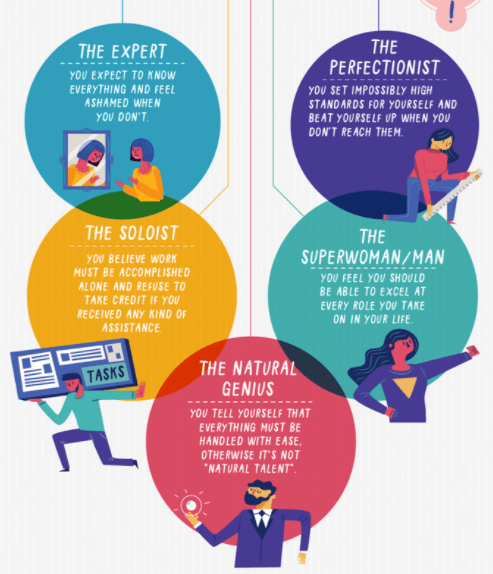
Ineffective boundary setting
It’s a fact that some of us find saying “No” harder than others — especially in a work environment.
It may be that we want people to see us as helpful and willing to go the extra mile. Or maybe we value being seen as competent with almost unlimited capacity to get work done.
Plus, saying “No” involves confrontation, which often feels uncomfortable.
Lack of skills or training
Sometimes we’re asked to tackle something at work that we don’t have the capability for. Without the right skills or training, it’s no wonder that tasks take longer than expected.
Plus, as we’ve seen above, sometimes it’s hard to ask for support, especially if we’re new to the company or want to impress.
Procrastination
There are other times when we’re perfectly capable of tackling the task at hand, but we just can’t find the motivation.
We distract ourselves with coffee breaks, memes, and gossip until it’s the end of the day, and there’s still a pile of work to get through. This means we end up putting in more hours at our desk than we’d hoped.
This one is less about working harder, but it’s definitely one to nip in the bud when thinking about working smarter.
What can we do to work smarter, not harder?
So, that said, what can we do to help ourselves work smarter and reclaim our free time?
Getting the most from any ‘work smarter, not harder’ strategy requires both individuals and businesses to invest in maximizing productivity and creating balance.
As individuals, we can try the following:
Don’t sweat the small stuff
Our endless to-do lists are making us less productive. We need to prioritize work that is actually important and likely to impact our teams and businesses positively.
Happily, there’s an easy way to figure out the work you should be doing.
Dwight D. Eisenhower, military leader and 34th President of the United States, was a pretty busy guy. He was concerned about concentrating his efforts where they would create the most value.
He created a matrix to organize his work by order of importance and urgency.
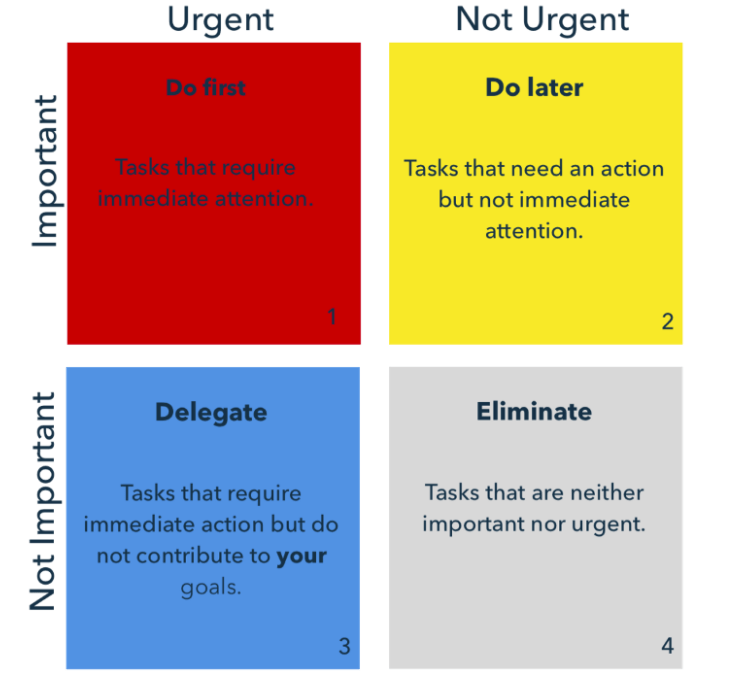
Urgent and important tasks were tackled first, and important tasks that weren’t urgent were tackled later.
Tasks deemed urgent but not important were delegated to other people so the President could concentrate on more important matters.
Tasks judged unimportant and not urgent were eliminated.
monday.com makes it simple to focus your efforts on important work. First, use our task tracker to identify all the work that needs to be done.
Then, use our status columns to assign work a priority based on its importance and urgency. And, for work that needs delegating, easily assign owners using our drag-and-drop functionality.
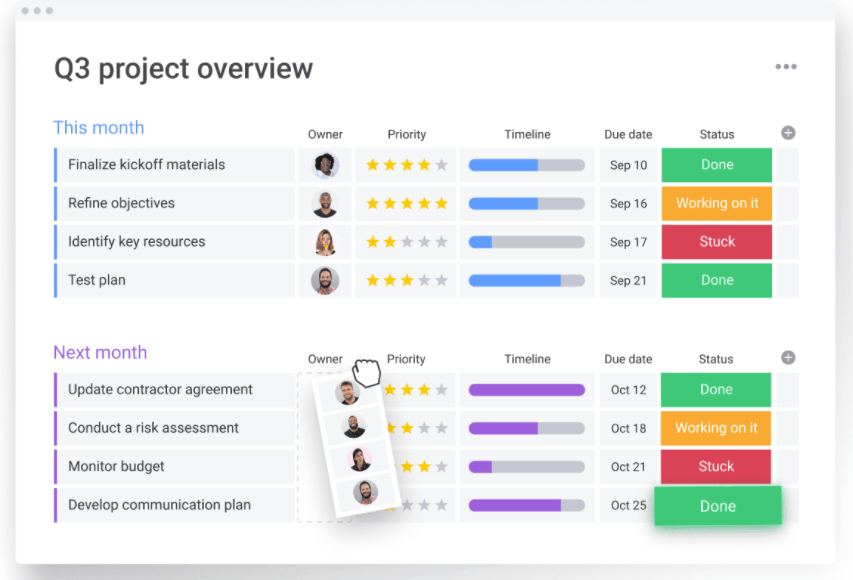
The only thing the monday.com Work OS can’t do is the actual work.
Measure results, not time
It’s essential to measure the outcome you’re creating rather than the time spent on a task.
While to-do lists can send us into a spiral of anxiety and distract us from meaningful work, creating a daily “done” list acts as a timely reminder of our achievements and a powerful motivator to tackle the next thing.Taking 5 minutes to reflect every day about what you’ve accomplished shows where you’re creating value. It’s also a handy record when appraisal time comes around.
Speaking of which, make sure to use language around “outcome” and “value” when you discuss tasks with management.
That helps them focus on what actually needs to be achieved rather than how. This means less micromanaging or monitoring whether you’re in the office or not. It’s an ideal situation if you’re someone who actually enjoys a lunch break.
Share the load
They say that a problem shared is a problem halved. If there’s an opportunity to rope others into the work you’re doing, take it!
Leaning on the skills of others can make tricky tasks easier. Plus, it’s usually more fun to get work done with your buddies than it is going solo.
If you are going to make requests of others, make sure you clearly communicate what needs doing and what a good outcome would look like.
What you don’t want is to have to redo work that’s been done poorly due to miscommunication.
And don’t forget about karma. If others have helped you get something done, make sure you take the time to repay the favor when they look to you for help.
monday.com makes collaborating super simple. Our intuitive interface means you can share, view, and annotate work plus @tag others for their input.
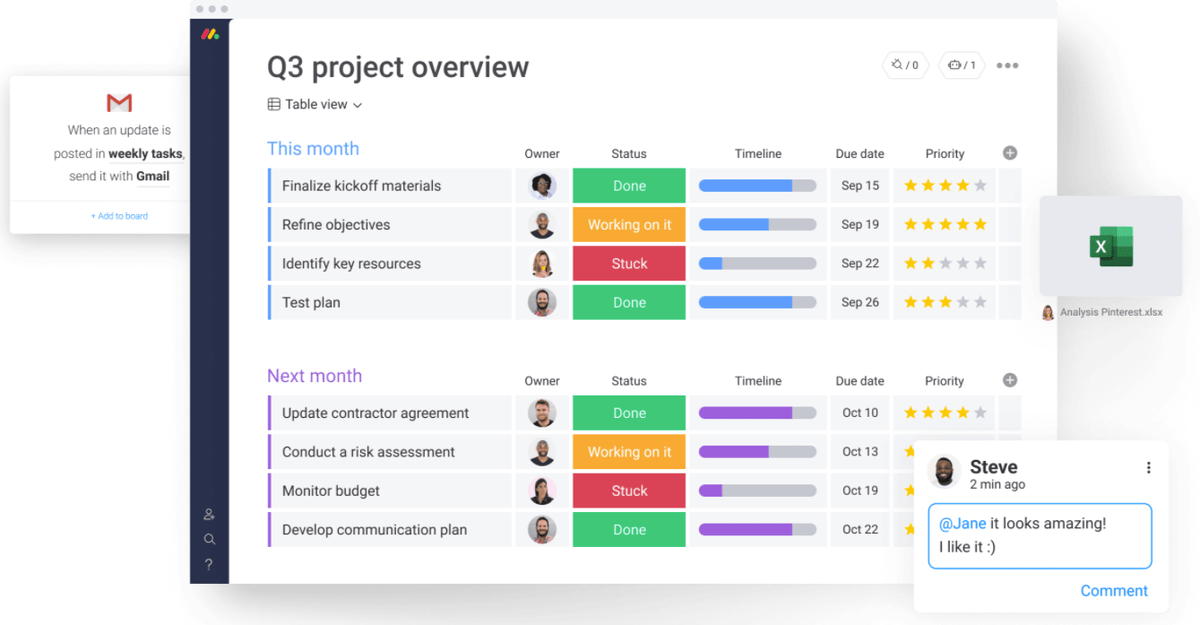
You can also communicate both in-platform and through integration with your favorite apps. This means that it’s easy to organize a round of celebratory drinks once the task is done.
Create and stick to a routine
Routines are vital for managing procrastination as they can help trick your brain into moving into work mode.
Plus, setting a routine prompts you to shut down at the end of the day and reduces the temptation of “just one more email.”
This is especially important as a freelancer or small business owner when you have total control over how you set your schedule, but, equally, the responsibility for your business sits squarely on your shoulders.
Don’t just build a work routine. Look at adding self-care activities into your weekly schedule — preferably ones you do with friends or pay for, so you’re less likely to skip them. This will help to counter the days when you can’t avoid overworking.
Automate more tasks
We’ve already explained the importance of focusing on tasks that are important and urgent. But, of course, there will still be some routine administrative work that needs doing.
You can try to automate repetitive manual tasks to help free you up to concentrate on activities that add value.
monday.com makes it easy to prioritize what to tackle next using our colorful status tags. And we have 100s of automations you can add to help you get your work done with less effort.
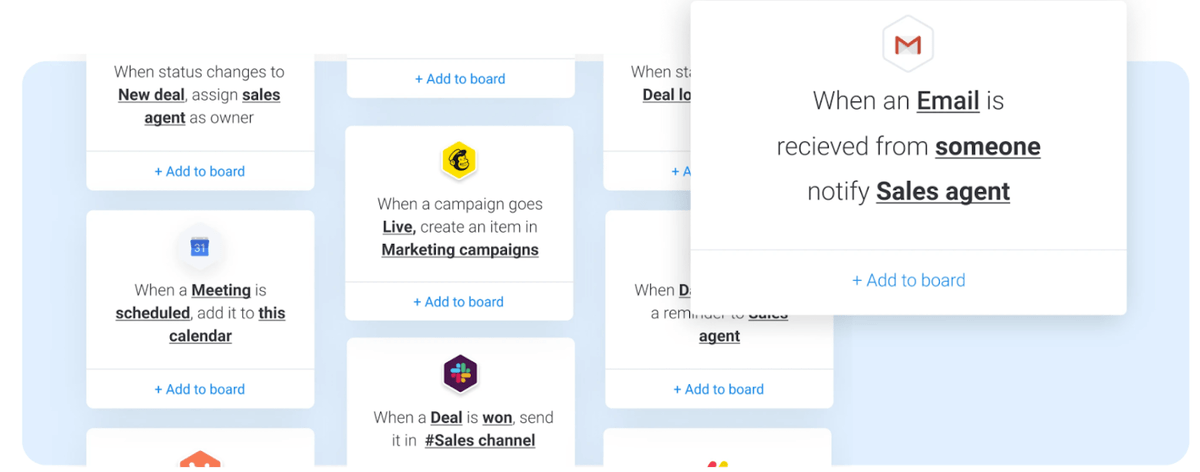
Stop multitasking
Psychologists believe we can only hold around 5–9 pieces of information in our brains at any one time. That means constantly attempting to multitask the 18 things on your to-do list is asking for trouble.
Trying to juggle multiple tasks reduces your ability to focus on getting things done and drains your mental energy.
Once you’ve narrowed down the most important tasks you need to get done — thank you Eisenhower matrix — ignore all other distractions and knuckle down to the task in hand.
Once it’s completed, review your to-do list to decide what’s essential. Your poor tired brain will thank you for it.
What can businesses do to maximize productivity?
To maximize the opportunities for employees to work smarter, not harder, businesses need to take responsibility for the working culture they’ve created.
C-suite members should be working with human resources to create policies that encourage a flexible approach to work and support a good work-life balance.
Teams should be encouraged to find processes that support intelligent, outcome-driven working practices. A presenteeism culture should be discouraged.
That means leaders are going to have to walk the walk. Visible examples of leaders working smarter permit employees to do the same.
It’s much easier to take a break or head home at a reasonable time if you’ve also seen the CEO sitting down for lunch in the cafeteria or the VP of Sales finishing work at 5 p.m.
That goes for emailing too. Don’t email your staff in the evening or during the weekend. It sets an expectation that they reply outside of normal working hours, even if you assure them they don’t have to.
If you must work on weekends, set your emails to send at 9 a.m. on a Monday, so your team gets the downtime they need to function best.
Finally, invest in software that supports employee productivity and engagement.
The best platforms should offer:
- Effective scheduling and time management
- Automation of repetitive tasks
- Integrations with other productivity tools
- Easy-to-use collaboration options
If you choose monday.com, you already know our platform helps employees to plan, prioritize, and collaborate on their work.
You should also know that monday.com helps you automate more mundane tasks so your employees can focus on meaningful work.
In case you were wondering, this also increases their engagement levels.
Plus, monday.com has full-suite reporting capabilities, with 8+ different ways to view your data.
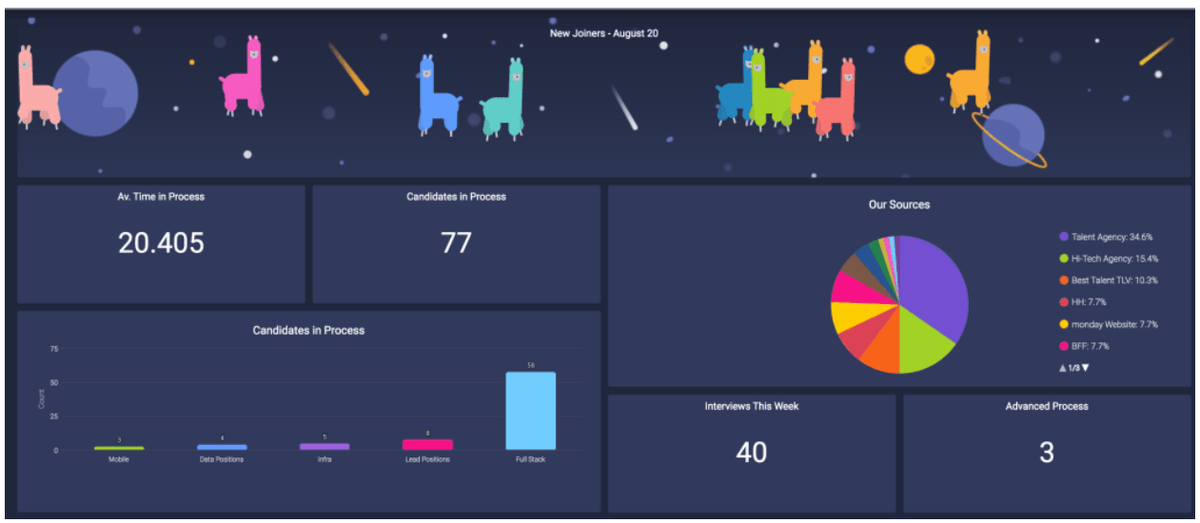
There are also 40+ integrations with other tools your business probably already uses. So monitoring and maximizing your productivity has never been easier.
What benefits does working smarter create for businesses?
Aside from more engaged and productive employees, working smarter reduces incidences of absenteeism.
Overwork causes significant stress and increases sickness levels in employees. This means when they finally give in to illness, they’ll probably be off for longer. Paying out way more than you expected in sick pay is a dent in your revenue you can live without.
On the flip side, if you look after your employees, they become ambassadors for your company. That can be great for your brand’s reputation.
Plus, it increases your talent pool as more people become interested in working for you. 40% of leaders are worried about a talent scarcity impacting their businesses, so this is a benefit not to be sniffed at.
Take the first step to working smarter
In this article, we’ve considered why we feel obligated to work so hard and offered 6 steps you can put in place to start working smarter.
We’ve also looked at how businesses can support employees to develop a smarter approach to working and the mutual benefits that it creates.
Software can help you with the practicalities of working smarter, not harder. You just need to take a deep breath and take the first step. Why not get started with our monday.com daily task tracker?

